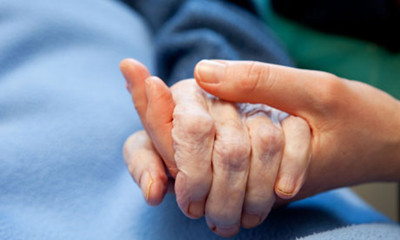
摘要:一名護(hù)士曾記錄了將死之人最常見(jiàn)的憾事,排在榜首的是“希望自己工作別那么努力”
There was no mention of more sex or bungee jumps. A palliative nurse who has counselled the dying in their last days has revealed the most common regrets we have at the end of our lives. And among the top, from men in particular, is 'I wish I hadn't worked so hard'.
從未有人提過(guò)自己最遺憾的是應(yīng)該多一些性愛(ài)或蹦極跳運(yùn)動(dòng)。一名舒緩療法護(hù)士在病人最后的日子里對(duì)其進(jìn)行了一些調(diào)查,向我們展示了人的一生最常見(jiàn)的幾大遺憾。位居榜首的是,尤其對(duì)于男性,“希望自己工作別那么努力。”
Bronnie Ware is an Australian nurse who spent several years working in palliative care, caring for patients in the last 12 weeks of their lives. She recorded their dying epiphanies in a blog called Inspiration and Chai, which gathered so much attention that she put her observations into a book called The Top Five Regrets of the Dying.
布羅妮·瓦爾是澳大利亞的一名護(hù)士,多年來(lái)一直從事舒緩療法護(hù)理工作,照顧生命僅余12周的病人。她將病人彌留之際的頓悟記錄在自己的博客中——Inspiration and Chai,該博客引起了很多注意,因此,她又將自己的觀察發(fā)現(xiàn)寫(xiě)成了一本書(shū),名為《人在彌留之際的五大憾事》。
Ware writes of the phenomenal clarity of vision that people gain at the end of their lives, and how we might learn from their wisdom. "When questioned about any regrets they had or anything they would do differently," she says, "common themes surfaced again and again."
瓦爾在書(shū)中寫(xiě)到了人在死亡將至?xí)r異常清晰的視角,以及我們?nèi)绾螐钠淙松腔壑蝎@取知識(shí)。“當(dāng)問(wèn)到病人有何遺憾之事或是有機(jī)會(huì)可以重來(lái)的事情時(shí),”她說(shuō),“反復(fù)再三都表現(xiàn)出一些共同的主題。”
Here are the top five regrets of the dying, as witnessed by Ware:
下面就是由瓦爾調(diào)查所知的人生五大憾事:
1. I wish I'd had the courage to live a life true to myself, not the life others expected of me.
1.我希望能夠有勇氣活出真正的自己,而不是按別人的期望生活。
"This was the most common regret of all. When people realise that their life is almost over and look back clearly on it, it is easy to see how many dreams have gone unfulfilled. Most people had not honoured even a half of their dreams and had to die knowing that it was due to choices they had made, or not made. Health brings a freedom very few realise, until they no longer have it."
“這是所有人最常見(jiàn)的憾事。當(dāng)人們意識(shí)到自己的生命即將結(jié)束并清晰地回頭看時(shí),很容易發(fā)現(xiàn)自己有多少夢(mèng)想沒(méi)有實(shí)現(xiàn)。大多數(shù)人甚至連一半夢(mèng)想都沒(méi)有實(shí)現(xiàn)就要面對(duì)死亡了,卻明明知道這一切歸咎于自己選擇了或是沒(méi)有選擇。健康帶給人的自由幾乎很少人有人意識(shí)到,往往失去了才悔之晚矣。”
2. I wish I hadn't worked so hard.
2.我希望自己工作別那么努力。
"This came from every male patient that I nursed. They missed their children's youth and their partner's companionship. Women also spoke of this regret, but as most were from an older generation, many of the female patients had not been breadwinners. All of the men I nursed deeply regretted spending so much of their lives on the treadmill of a work existence."
“這是我護(hù)理過(guò)的所有男性病人的肺腑之言。他們錯(cuò)過(guò)了照顧孩子的美好時(shí)光,忘記了與伴侶的甜蜜相伴。女性也談到了這方面的遺憾,但大多出自老一輩之口,許多女性病人一直未擔(dān)過(guò)養(yǎng)家糊口的重任。”
3. I wish I'd had the courage to express my feelings.
3.我希望能夠有勇氣表達(dá)自己的感受。
"Many people suppressed their feelings in order to keep peace with others. As a result, they settled for a mediocre existence and never became who they were truly capable of becoming. Many developed illnesses relating to the bitterness and resentment they carried as a result."
“許多人為了與他人和平相處,拼命壓制自己的感情。結(jié)果,他們勉強(qiáng)滿(mǎn)足于平庸的生存狀態(tài),從未成為自己真正有能力成為的人。因此,就有一大批人由于忍受人生中的痛苦與怨恨罹患各種疾病。”
4. I wish I had stayed in touch with my friends.
4.我希望我能與朋友們保持聯(lián)系。
"Often they would not truly realise the full benefits of old friends until their dying weeks and it was not always possible to track them down. Many had become so caught up in their own lives that they had let golden friendships slip by over the years. There were many deep regrets about not giving friendships the time and effort that they deserved. Everyone misses their friends when they are dying."
“通常情況下,直到生命即將結(jié)束,人們才能真正意識(shí)到老朋友對(duì)于自己多么重要,但想聯(lián)系到他們并不是很輕易就能實(shí)現(xiàn)的。許多人都是由于平時(shí)太忙,以致美好的友誼隨著時(shí)光的流逝也慢慢逝去。我們因自己未付出足夠的時(shí)間與精力來(lái)維持友誼而抱有深深的遺憾。每個(gè)人都會(huì)在彌留之際思念朋友。”
5. I wish that I had let myself be happier.
5.我希望能讓自己更快樂(lè)。
"This is a surprisingly common one. Many did not realise until the end that happiness is a choice. They had stayed stuck in old patterns and habits. The so-called 'comfort' of familiarity overflowed into their emotions, as well as their physical lives. Fear of change had them pretending to others, and to their selves, that they were content, when deep within, they longed to laugh properly and have silliness in their life again."
“雖說(shuō)這一點(diǎn)出人意料,卻也是普遍存在的遺憾。許多人直到將死之時(shí)才意識(shí)到快樂(lè)是個(gè)選擇。他們墨守成規(guī)與舊習(xí),這種所謂的來(lái)自對(duì)某種東西熟悉的‘舒適’既充斥了他們的情感也充滿(mǎn)了物質(zhì)生活。懼怕改變使得他們對(duì)他人偽裝,也對(duì)自己偽裝,才得到某種滿(mǎn)足,但在內(nèi)心深處,他們卻渴望笑得自在,糊糊涂涂再活一次。”
What's your greatest regret so far, and what will you set out to achieve or change before you die?
到目前為止,你最大的遺憾是什么呢,在生命結(jié)束之前,你要著手實(shí)現(xiàn)什么、改變什么呢?











